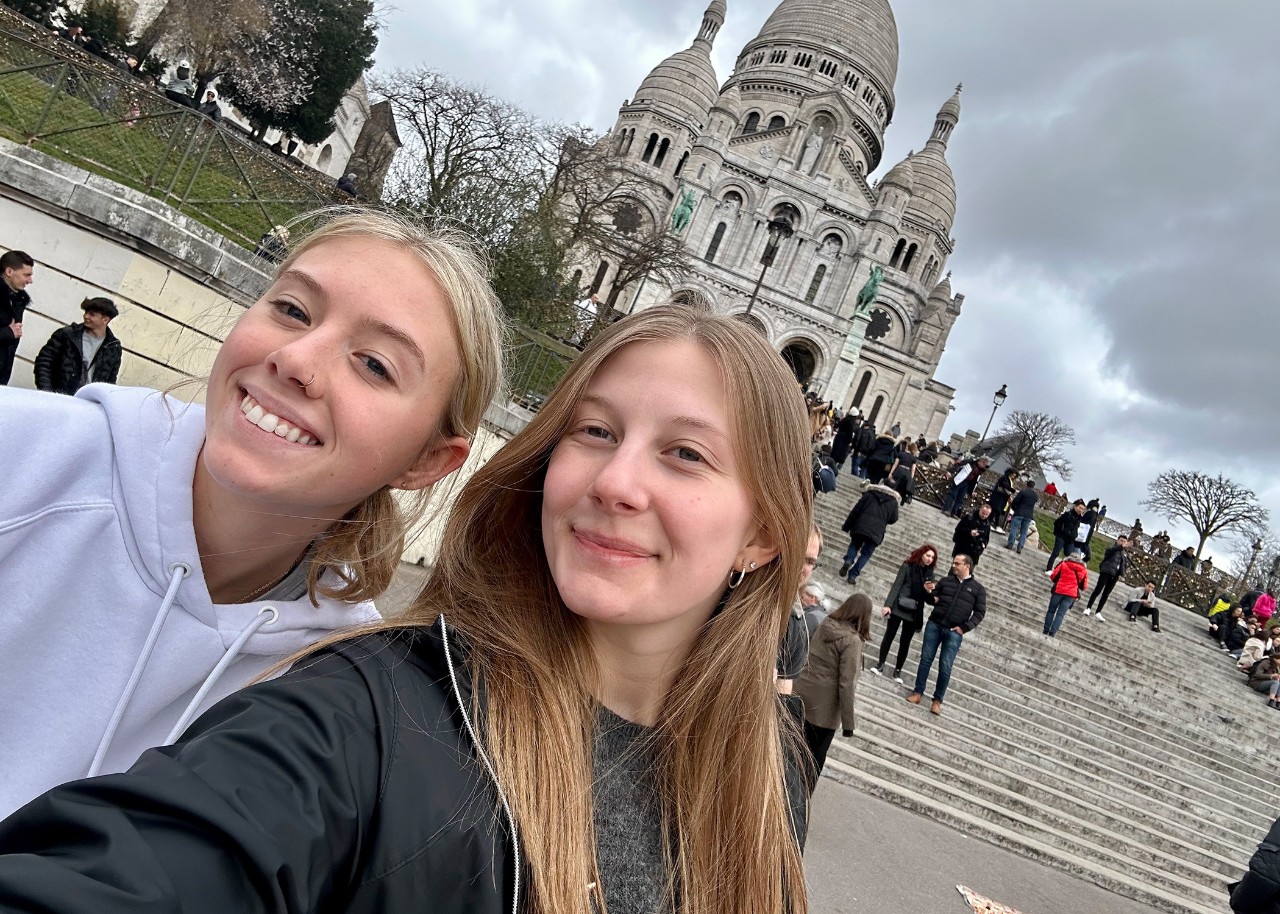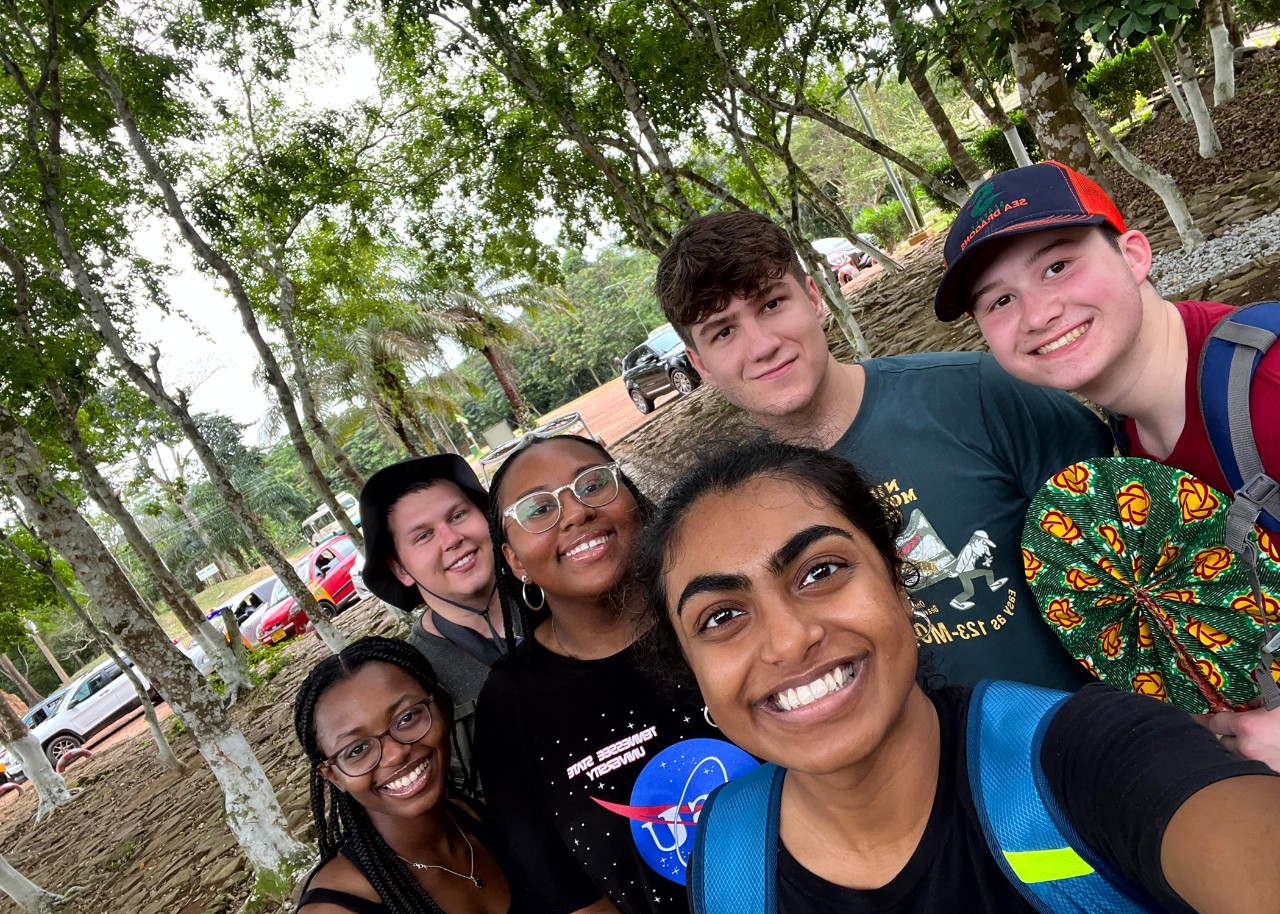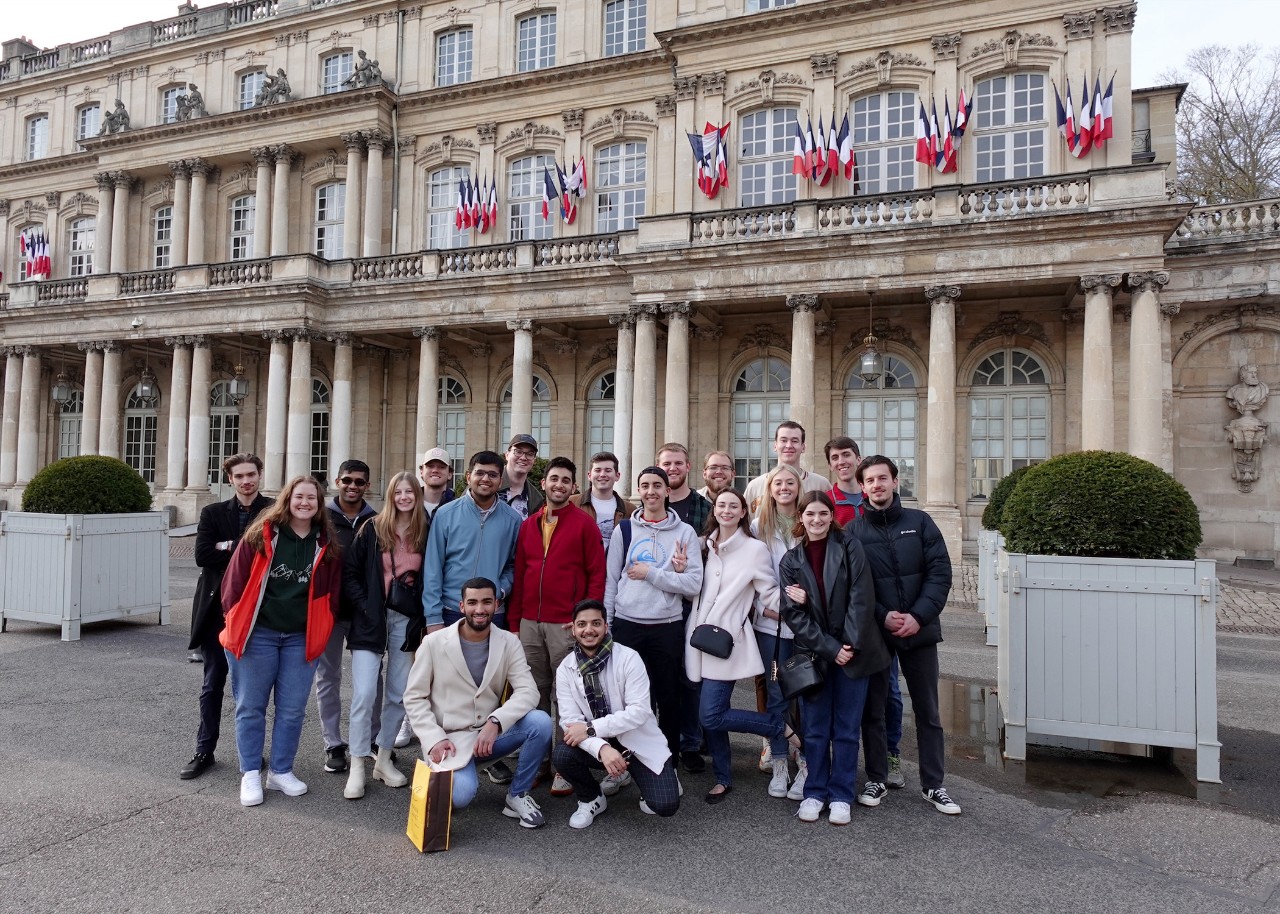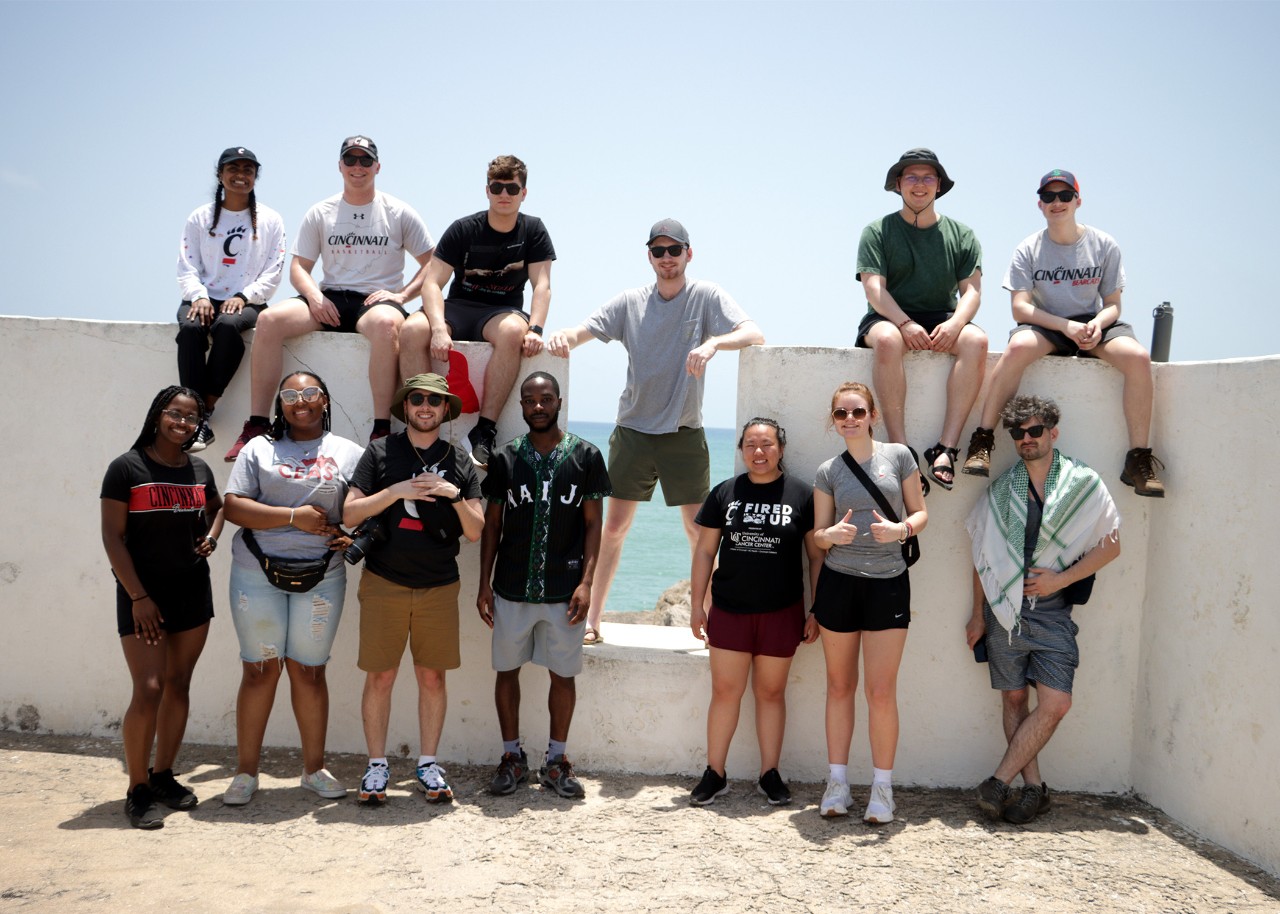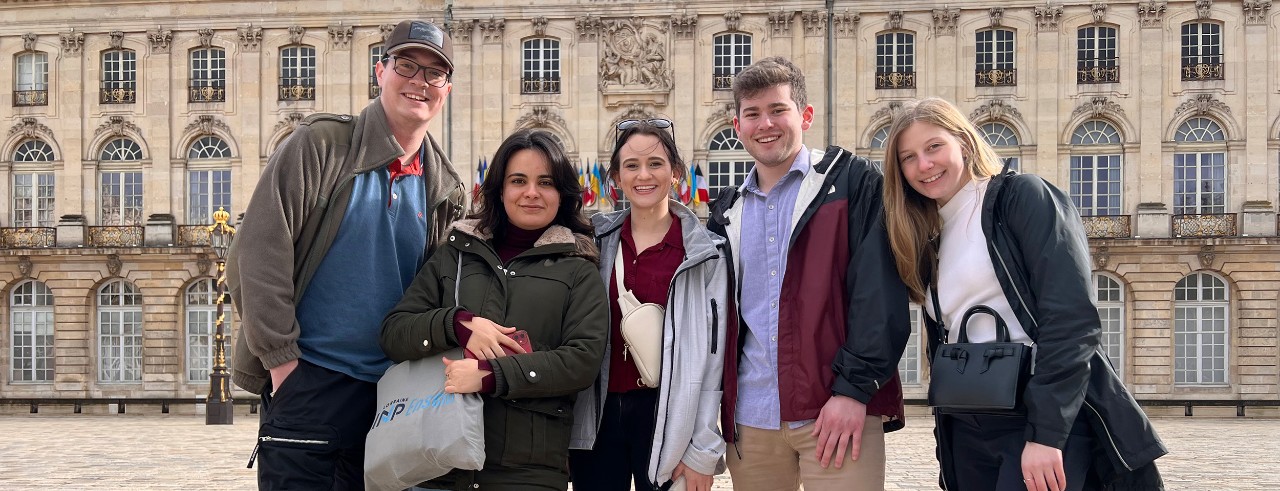
Global Technical Workforce course: Nine years, 11 study tours
Virtual-only during COVID, University of Cincinnati engineering/honors class travels once more
“The fundamental goal of engineering is to solve problems. And the best way to solve problems is to understand other people.”
This statement, by Cedrick Kwuimy, assistant professor/educator in the Department of Engineering & Computing Education, is why the College of Engineering & Applied Science at the University of Cincinnati offers the Global Technical Workforce course.
Eugene Rutz, assistant dean and manager master of engineering programs, created the course, the signature CEAS study abroad opportunity for nearly a decade. It is open to students in any technical field as an elective or breadth of knowledge course, and its study tours are also approved University Honors Program experiences.
This spring, Rutz taught the class, while Kwuimy and Jim Tappel led the tours to Ghana and France. Tappel is an advisor in UC’s College of Cooperative Education and Professional Studies and holds a faculty appointment in Engineering Education. Associate Professor Nora Honken of the same department and CEAS Senior Academic Advisor Madeline Bible were co-leads.
“The course is meant to provide professional skills that complement students’ technical skills,” said Rutz. “We talk about teamwork, about communication, about leadership, all in the context of being a part of a global team.
“We talk about cultural competence,” said Rutz. “And then going abroad provides that experience.”
The fundamental goal of engineering is to solve problems. And the best way to solve problems is to understand other people.
Cedrick Kwuimy Asst. professor/educator, Engineering Education
Faculty-led study abroad integrated into the curriculum is an important component of the University of Cincinnati’s Next Lives Here promise to provide experiential learning opportunities for all students.
Engineering by design
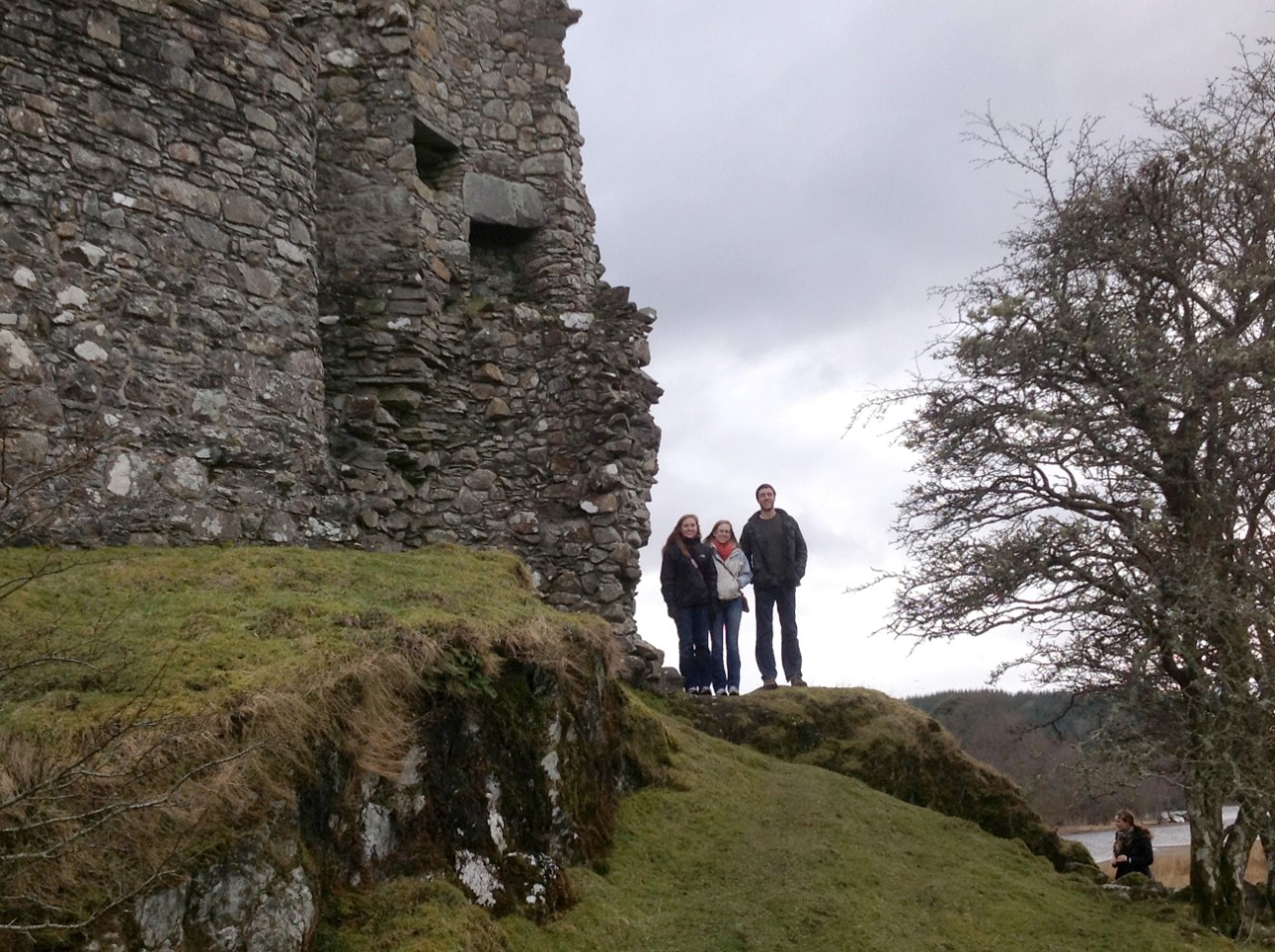
UC students in Scotland with the 2015 Global Technical Workforce program | Photo provided
Study abroad is usually hard for engineering students to fit into their highly structured curriculum and co-op schedule. But this course has offered them a global perspective on engineering in Scotland, France, Guatemala, Germany, Ireland and now Ghana. The Ghana tour was the college’s first study abroad program in Africa, originally developed by Kwuimy for spring 2020.
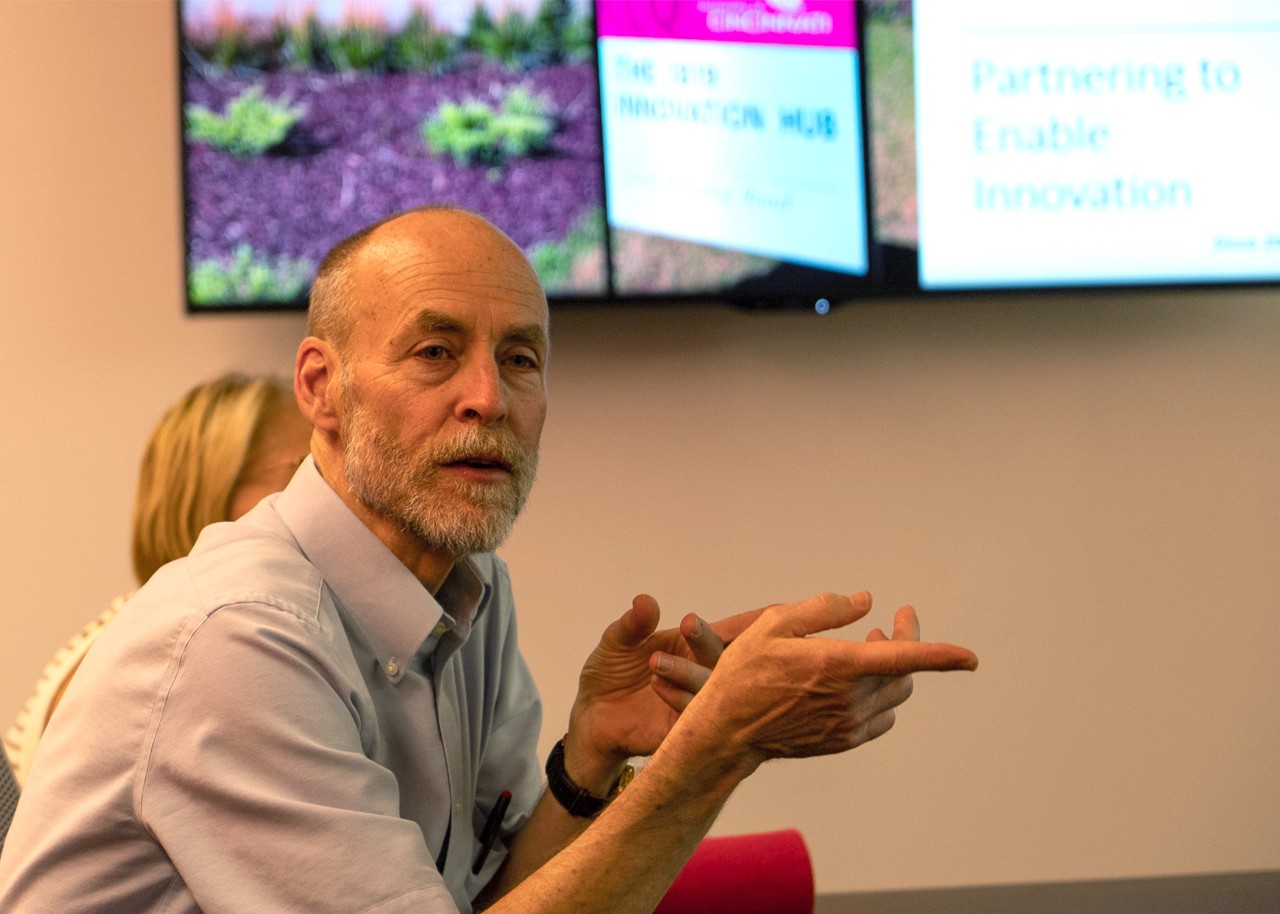
UC Assistant Dean Eugene Rutz, College of Engineering & Applied Science | Photo provided
Global Technical Workforce includes a semester-long virtual collaboration with an English class taught by Stéphanie Gallaire, director of international relations at the University of Lorraine ENSEM (School of Energy Engineering), a major CEAS partner. That collaboration began when the pandemic shut down travel in 2020.
Now, Global Technical Workforce students get the benefit of both remote teamwork and study abroad.
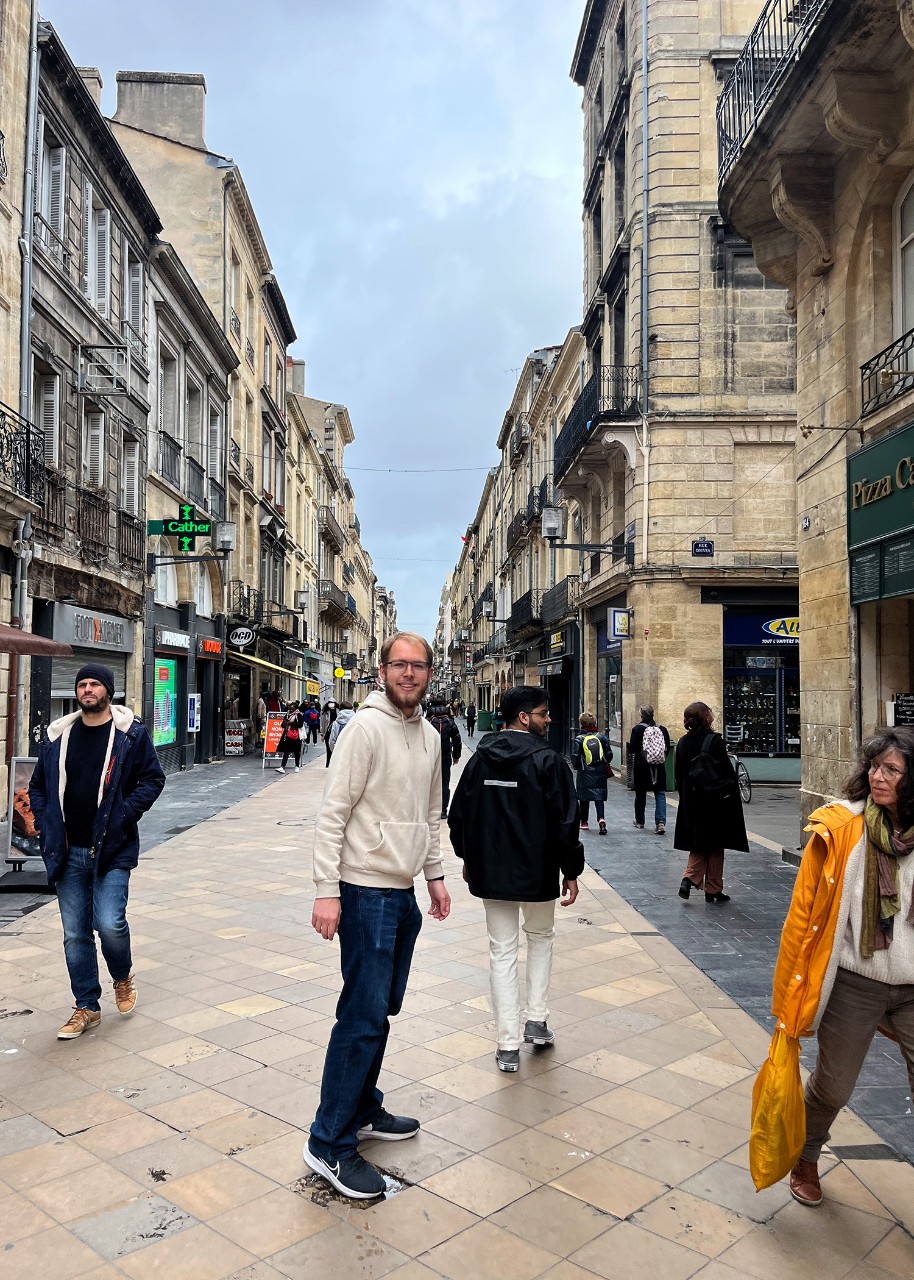
UC engineering student Kelsey Shannon in Bordeaux | Photo provided
Fifth-year electrical engineer Kelsey Shannon took the virtual-only class last year but audited it again for the study tour to France. Meeting the French students in person “demystified” the remote work, he said.
“It was much easier after the trip, because you knew them better. You could communicate through the virtual space better and read the subtext of messages.”
“It’s not just the work, it’s the people you work with, and how important that is in a business environment,” Tappel said, explaining that engineering students will need global competencies to thrive in the distinctive corporate cultures of multinational corporations.
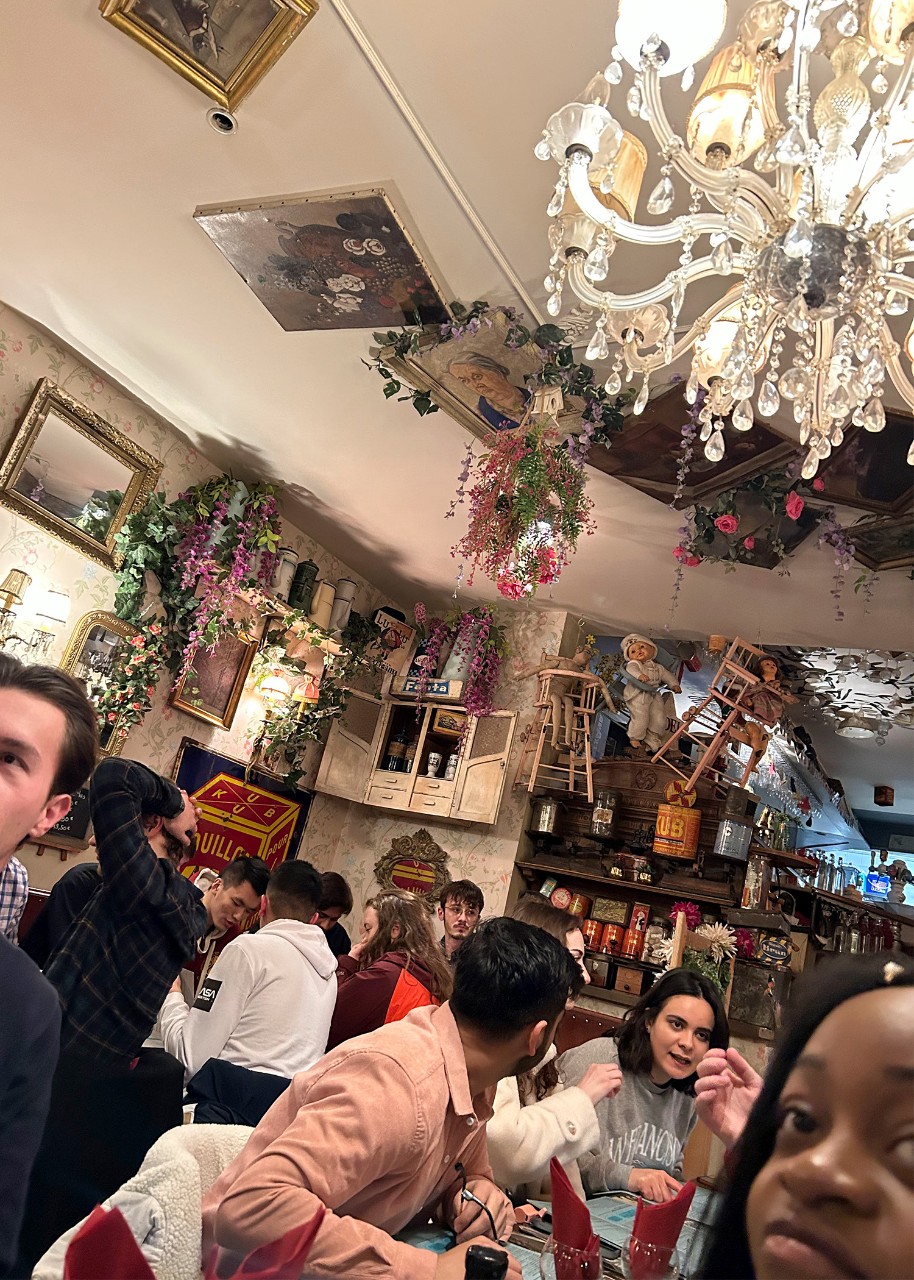
A meal in Nancy for the Global Technical Workforce France group. | Photo provided
The UC students received warm welcomes from their international hosts. When the France group arrived in Nancy, Gallaire’s class met their train from Paris carrying a UC banner and hosted a dinner for them.
“It was such a great time for us to relax and come together and learn about each other. We sat there for hours, just talking and figuring out the language barrier,” said Maddy Miller, a third-year biomedical engineer.
Miller enjoyed the group’s time at ENSEM, especially as her advanced classes at home are specialized.
“We saw the broad range of engineering,” she said. “We saw all their testing simulators and their labs and lectures, which are very different.”
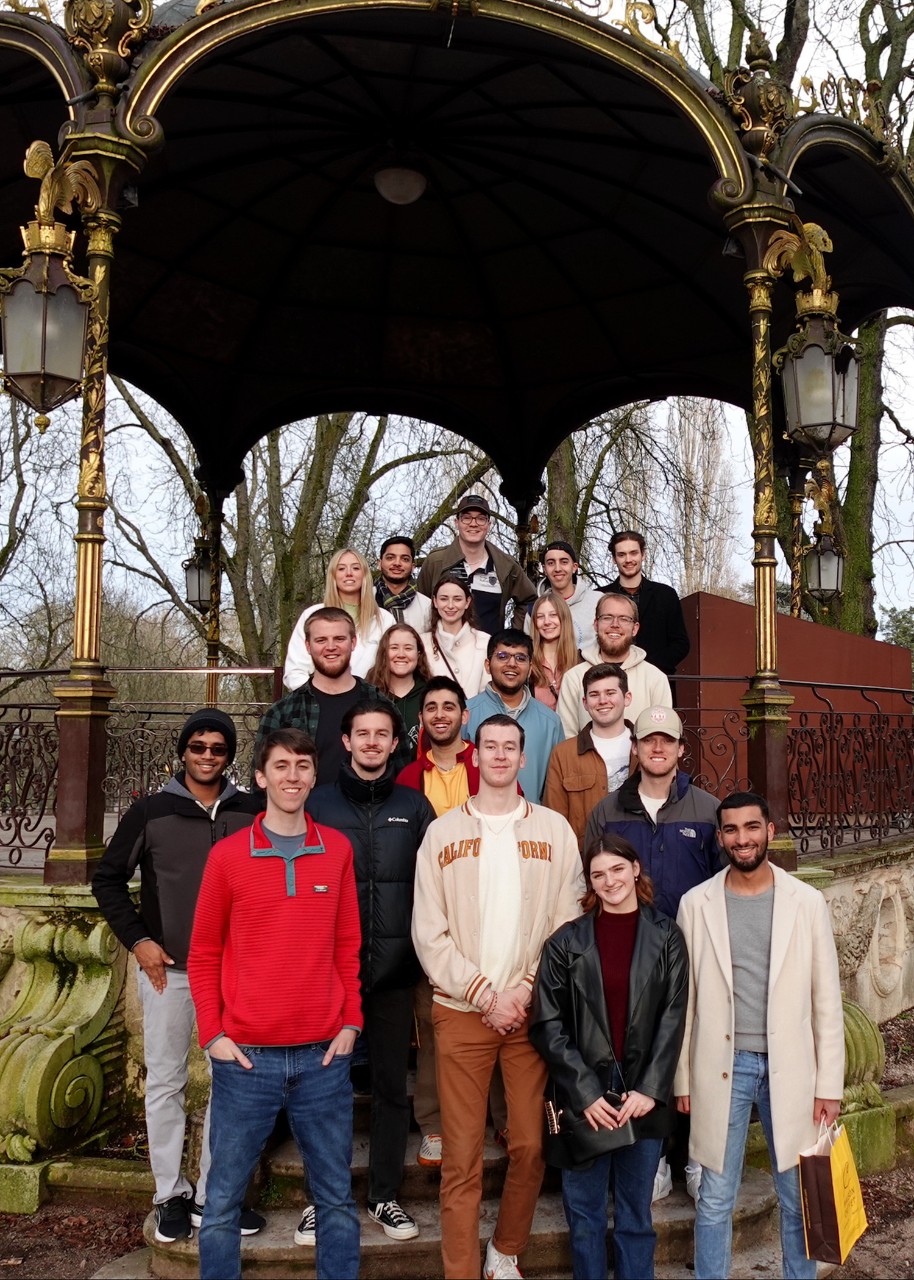
UC and ENSEM students at a park in Nancy | Photo Provided
Joint classroom work for the US and French students gave way to exploring Nancy. Alexis Belville, a first-year architectural engineer, said,
“We hung out with them all day. We got breakfast, we went to the aquarium, we went to a museum with them, we went to the park and played soccer. We taught them how to play PIG, the basketball game.
"And I have a core memory of me teaching them Cotton Eye Joe.”
The line dancing lesson became a highlight many mentioned about the trip.
Studying abroad teaches you things that you don't expect to learn.
Maddy Miller, UC biomedical engineering student
French connections
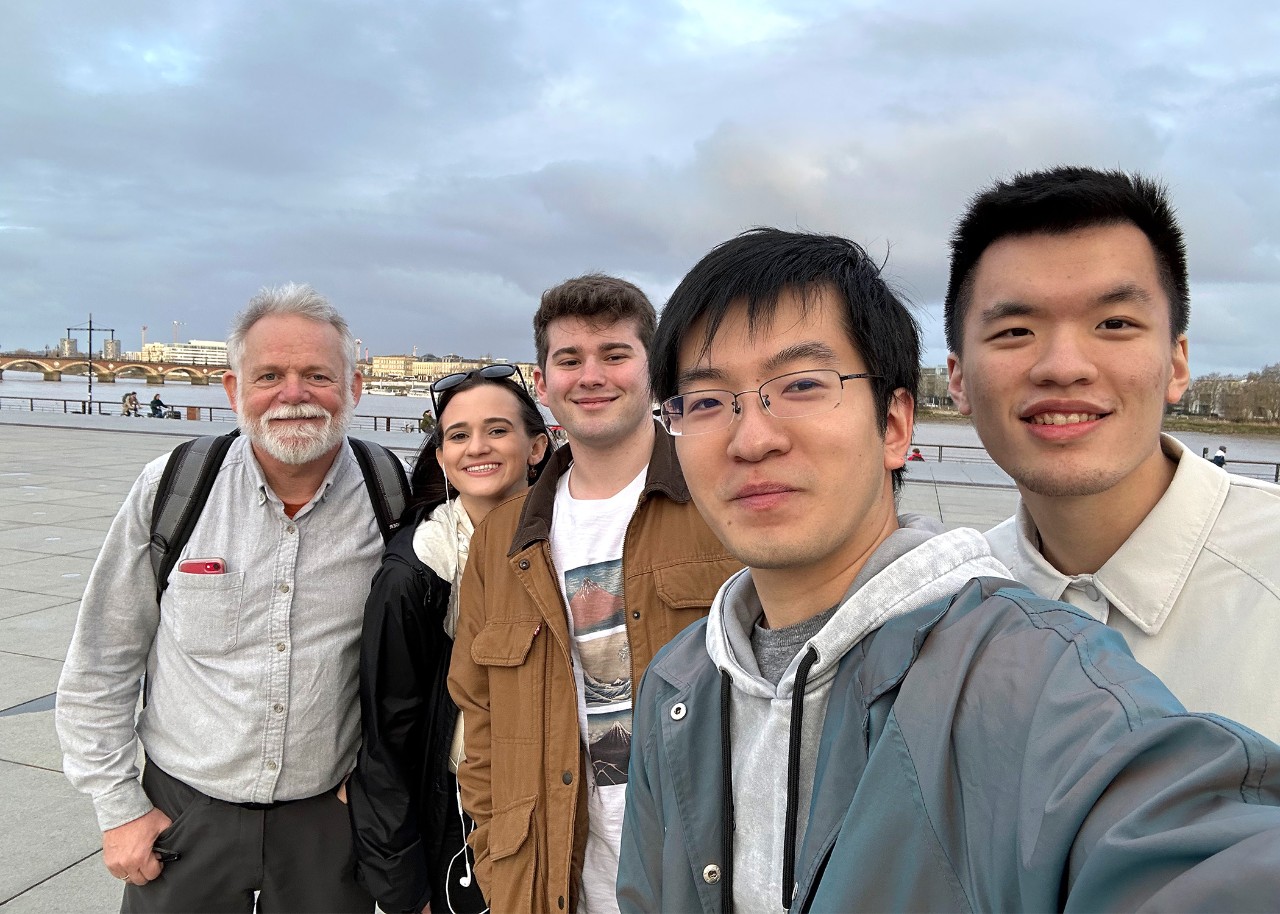
UC faculty lead Jim Tappel with students in the France group | Photo provided
At every stage, Tappel built in that free time to encourage developing multicultural skills. He had each student lead an activity or host a dinner. Dinner hosts had to plan a meal as though they were entertaining business guests: choosing a menu to accommodate dietary preferences, making reservations and leading conversation. Even something as basic as mastering public transport increased the students’ confidence.
“American travel is you by yourself in a car, dealing with other cars. You’re not dealing with a thousand people on the train,” said Shannon, who helped his group navigate connections for one side trip. The experience makes him feel ready for a solo summer trip he is planning. After multiple co-ops with Honda, he hopes eventually to work in Japan.
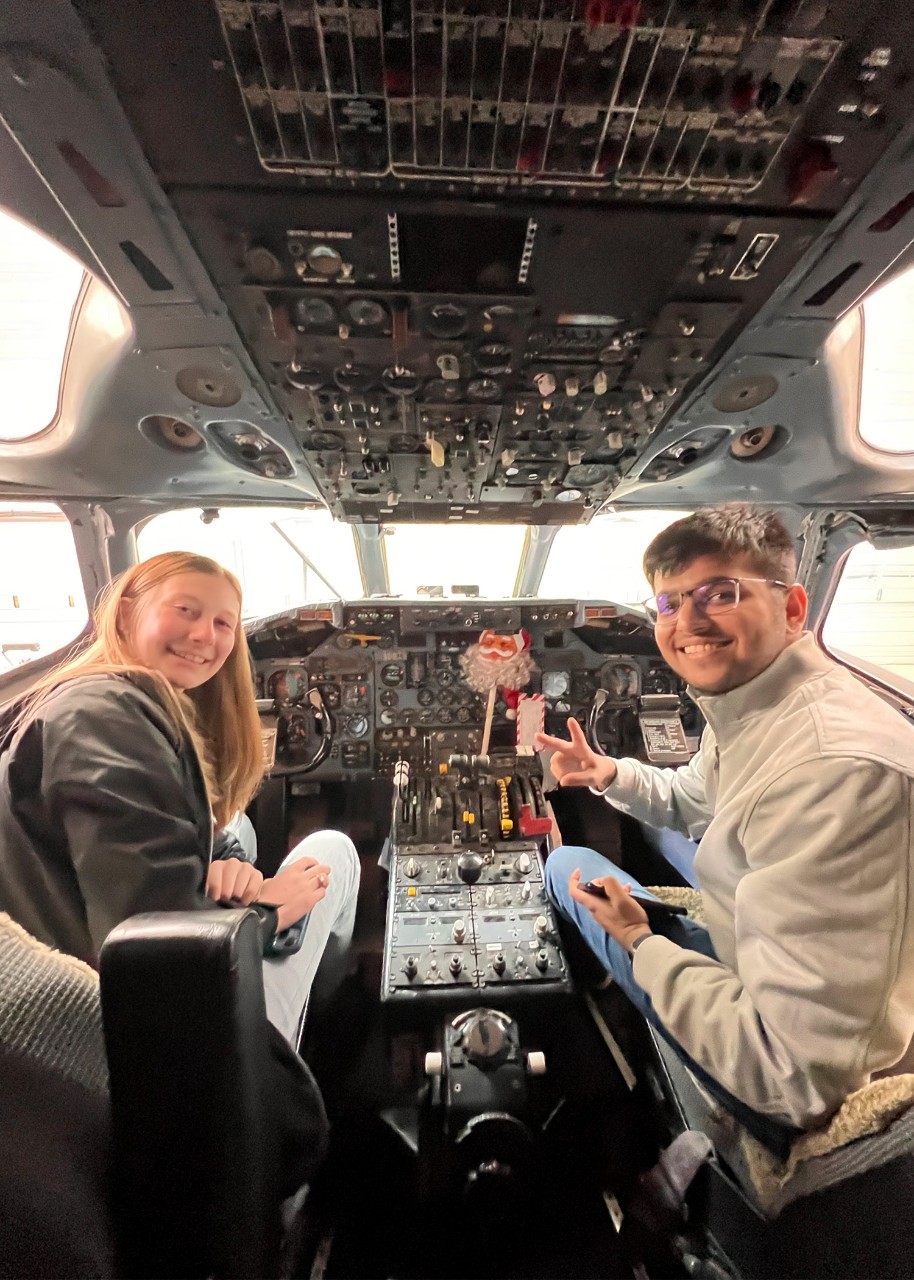
UC students Maddy Miller and Nehang Patel in a cockpit simulator at the University of Bordeaux Evering Institute | Photo Provided
After Nancy, the group went by train to Bordeaux, with a box of pastries from the ENSEM students for their journey.
The University of Bordeaux is one of the University of Cincinnati’s strategic partners. UC International develops these key institutional partnerships around the globe to sustain the university’s global educational and research missions. CEAS ties with Bordeaux include a double master’s program in aerospace industry systems operations (AESOP) open to students at both schools. The UC students got a personal tour of Evering, Bordeaux's aeronautical engineering institute.
“I'm not even in aerospace and I thought it was the coolest thing ever,” Miller said.
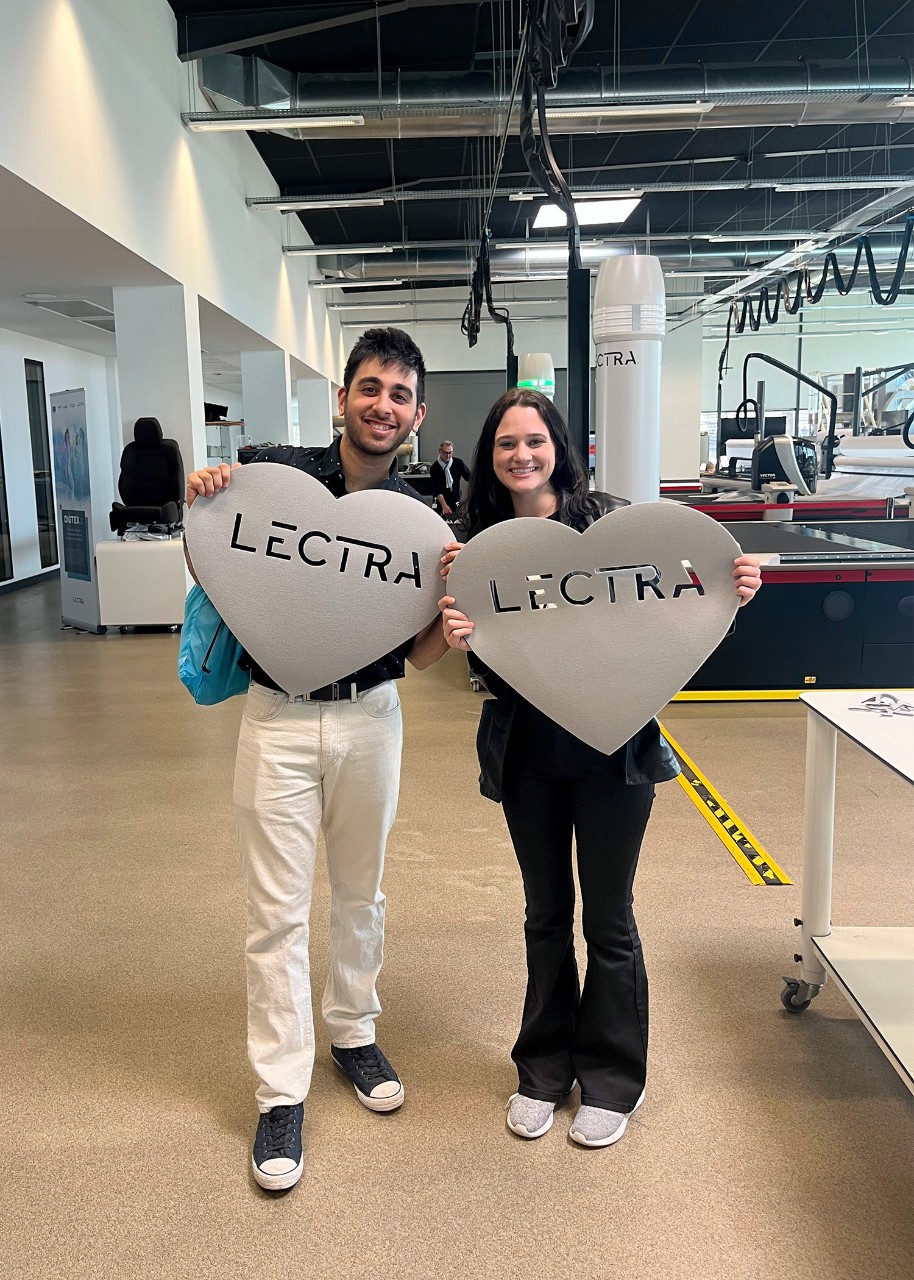
UC students Devansh Saxena and Leah Fenick on a tour of the Lectra plant in Bordeaux | Photo Provided
The group’s industry visit was to Lectra, the Bordeaux plant of an international company that produces automated systems for the fabric industry. Opportunities to connect engineering theory to practice are a feature of Global Technical Workforce.
Touring the plant, the students saw Lectra’s high-tech machinery (“engineers like that,” Tappel said), but they heard about Lectra’s global business.
Arunesh Mishra (computer engineering, 2023) enjoyed seeing how work works in France.
He came to UC from India and has done five US co-ops and one in Singapore.
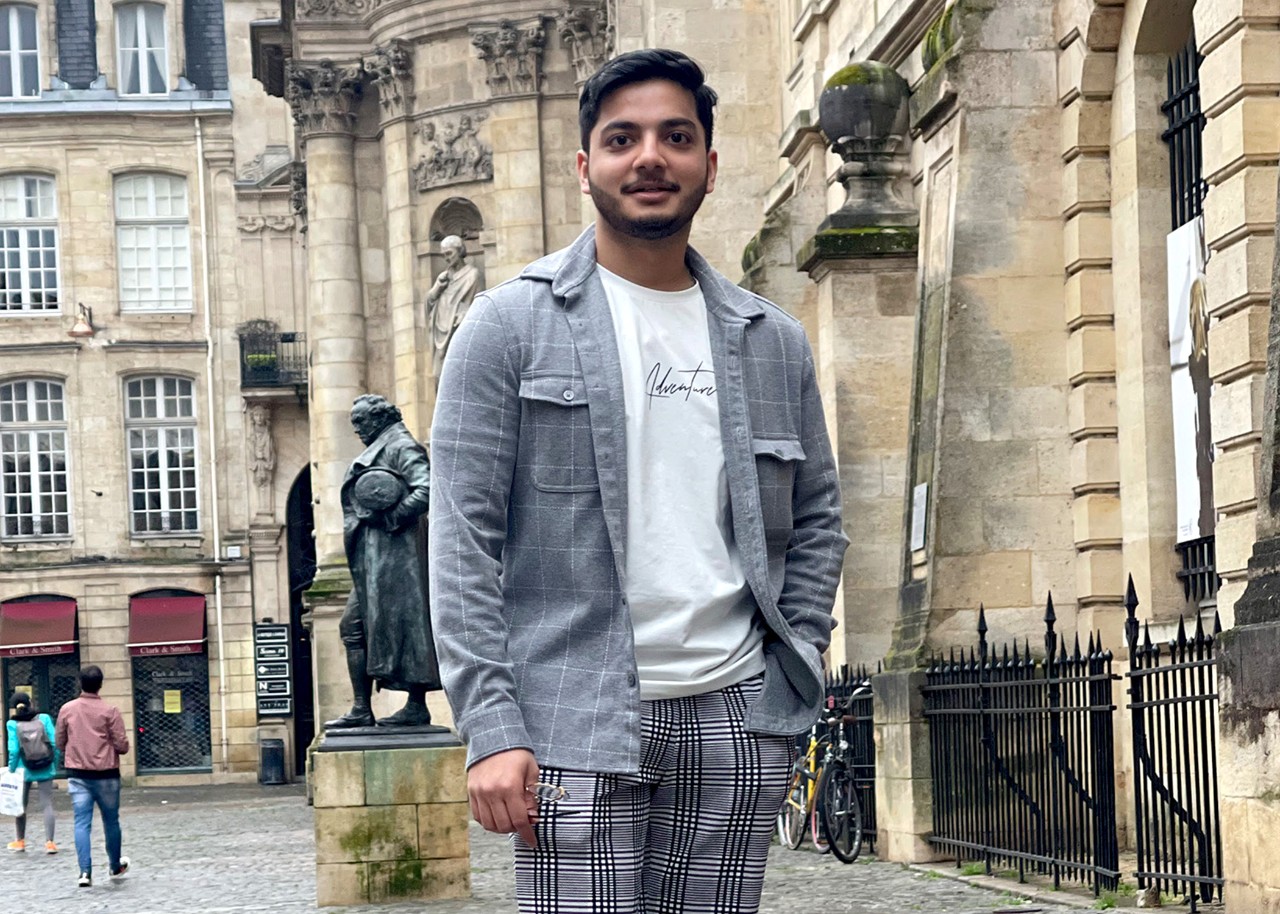
UC engineering student Arunesh Mishra in Bordeaux | Photo Provided
“In France, they focus most of their energy on balancing work and life," Mishra said.
"For example, it was interesting to see natural light coming inside the factory every few meters, which is not something I have seen before."
With the added perspective from this class, Mishra is considering working in Europe at some point.
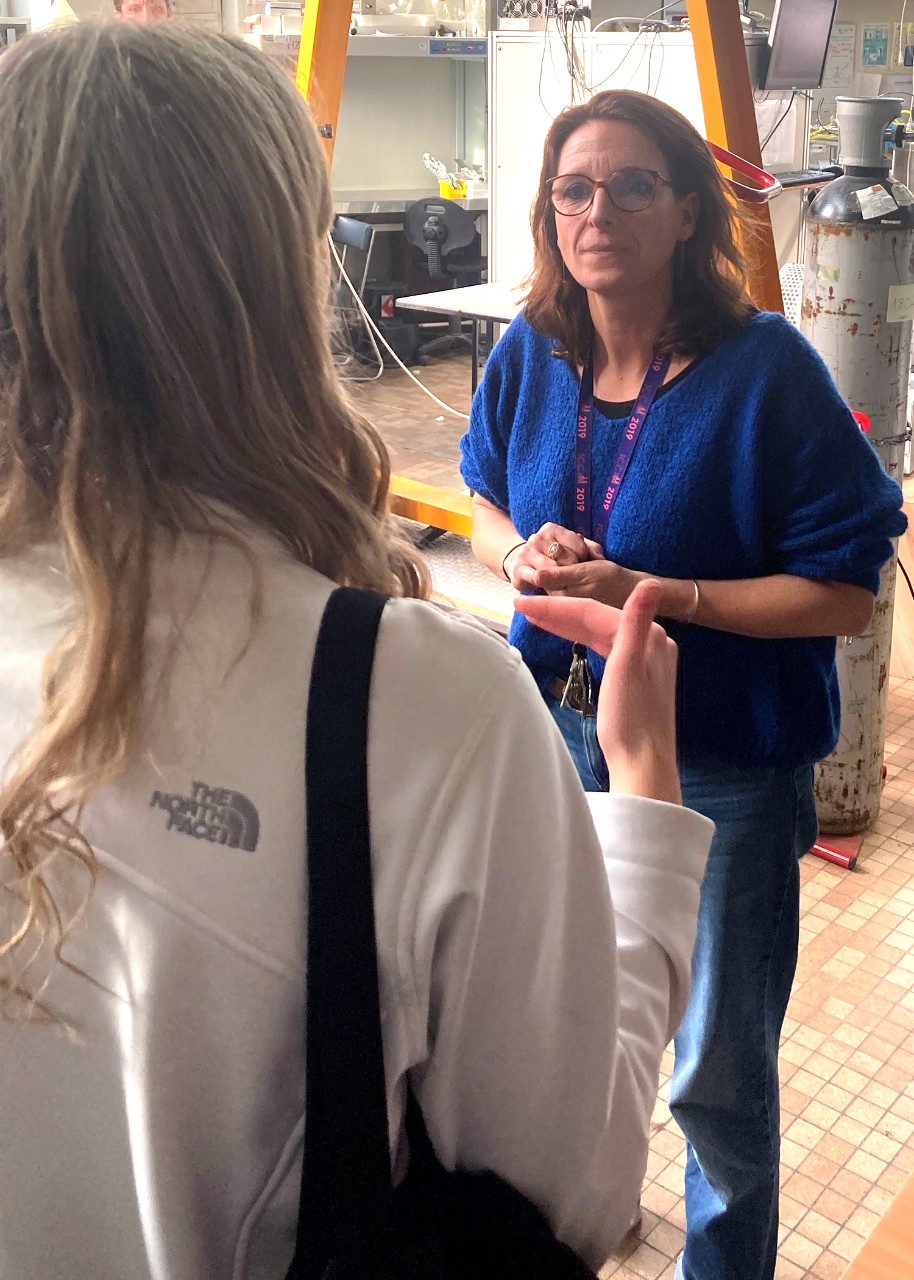
Benedicte Picquet-Varrault, director of CESAM, answers a question for UC student Alexis Belville | Photo provided
The last three days of the trip took the group to Paris.
The host for that leg of their journey was the Université Paris-Est Créteil (UPEC). UPEC is a developing CEAS partner.
Again students got a glimpse of what engineers in France are working on, with a tour of CESAM, UPEC's Chamber for Experimental Multiphase Atmospheric Simulation. CESAM is an environmental vacuum chamber that allows the modeling of atmospheric conditions to study the behavior of aerosols.
Getting to know Ghana
The students who went to Ghana with Kwuimy hadn’t met their hosts virtually before travel, but they too found a warm welcome.
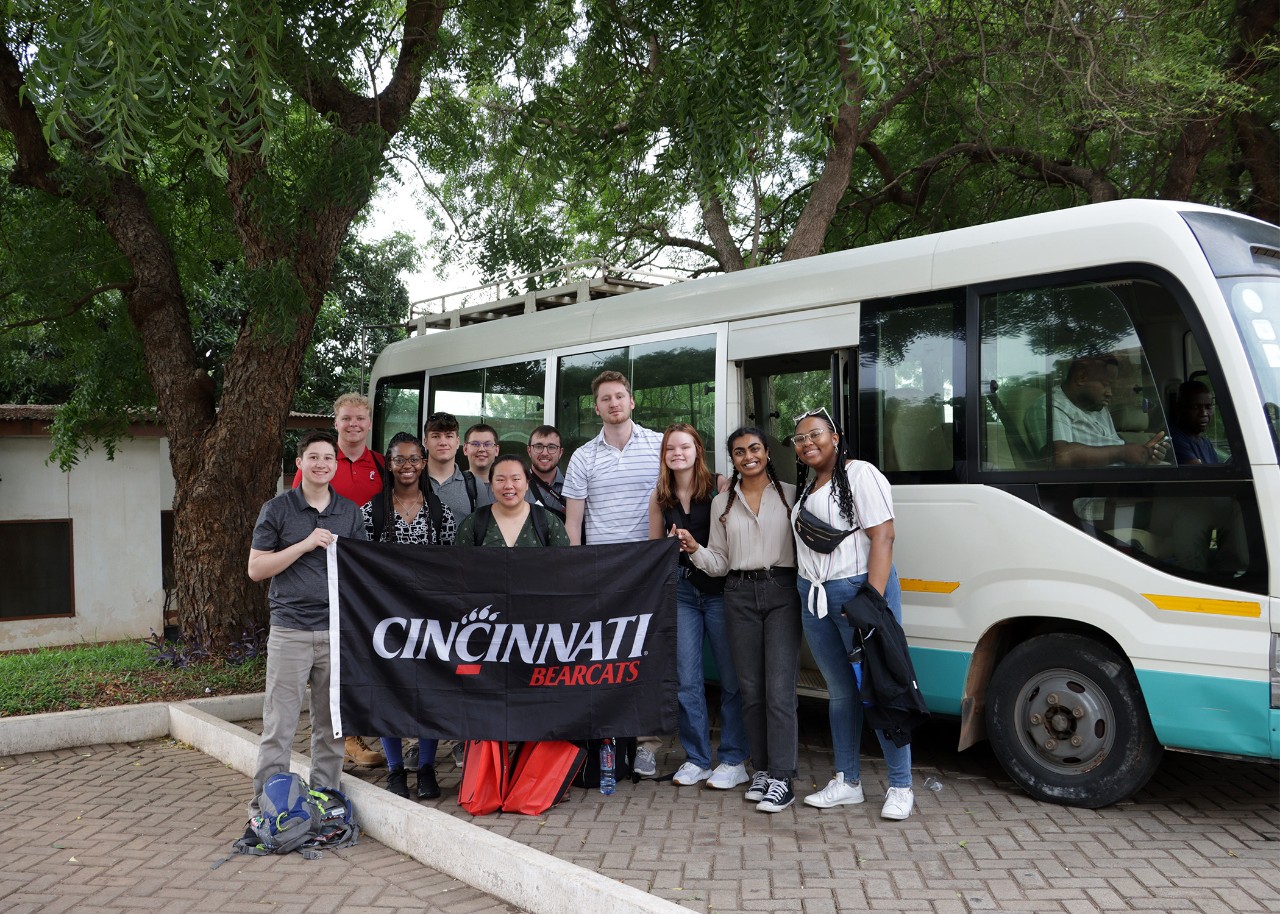
UC students in Ghana | Photo provided
The University of Cape Coast is a UC strategic partner. Kwuimy visited Ghana and UCC in 2019 to plan the study abroad program, and he later taught a virtual class with UCC Professor Kwadwo A. Dompreh. Grants from UC International support such strategic collaborations.
UCC’s international office helped with housing and travel arrangements for the entire Ghana trip, with staff members Emmanuel Abaidoo and Patrick Akai serving indispensably as guide and bus driver.
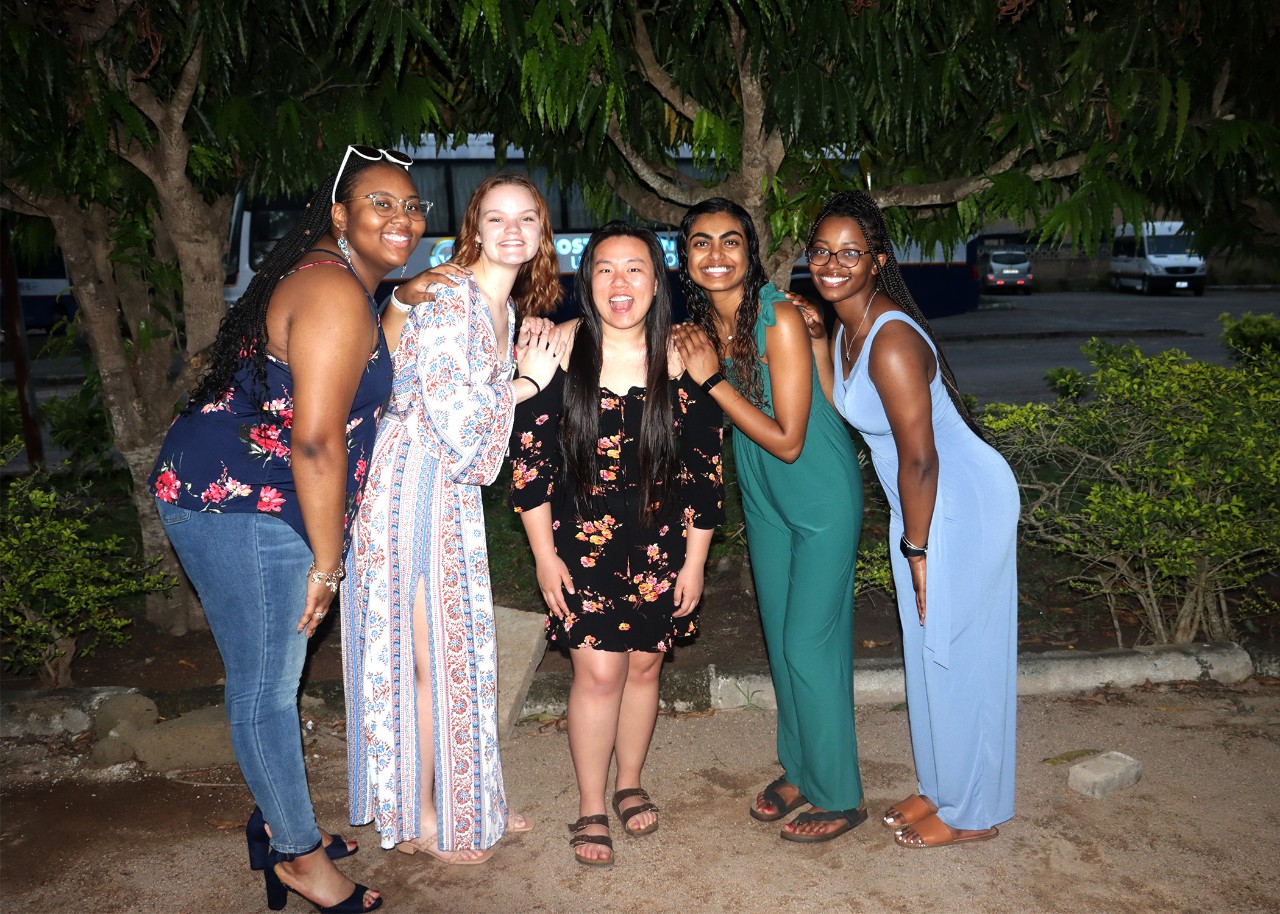
Some UC students on the Ghana tour (Beth Wilson, center) | Photo provided
Beth Wilson, a third/fourth-year chemical engineer, was in the group.
“Every place we stayed, we stayed with a university that sort of hosted us,” she said. “They were all lovely. We got to meet and speak to a lot of college students, which I absolutely loved, because I could really talk to someone and understand their culture and lifestyle and learn what school is like.”
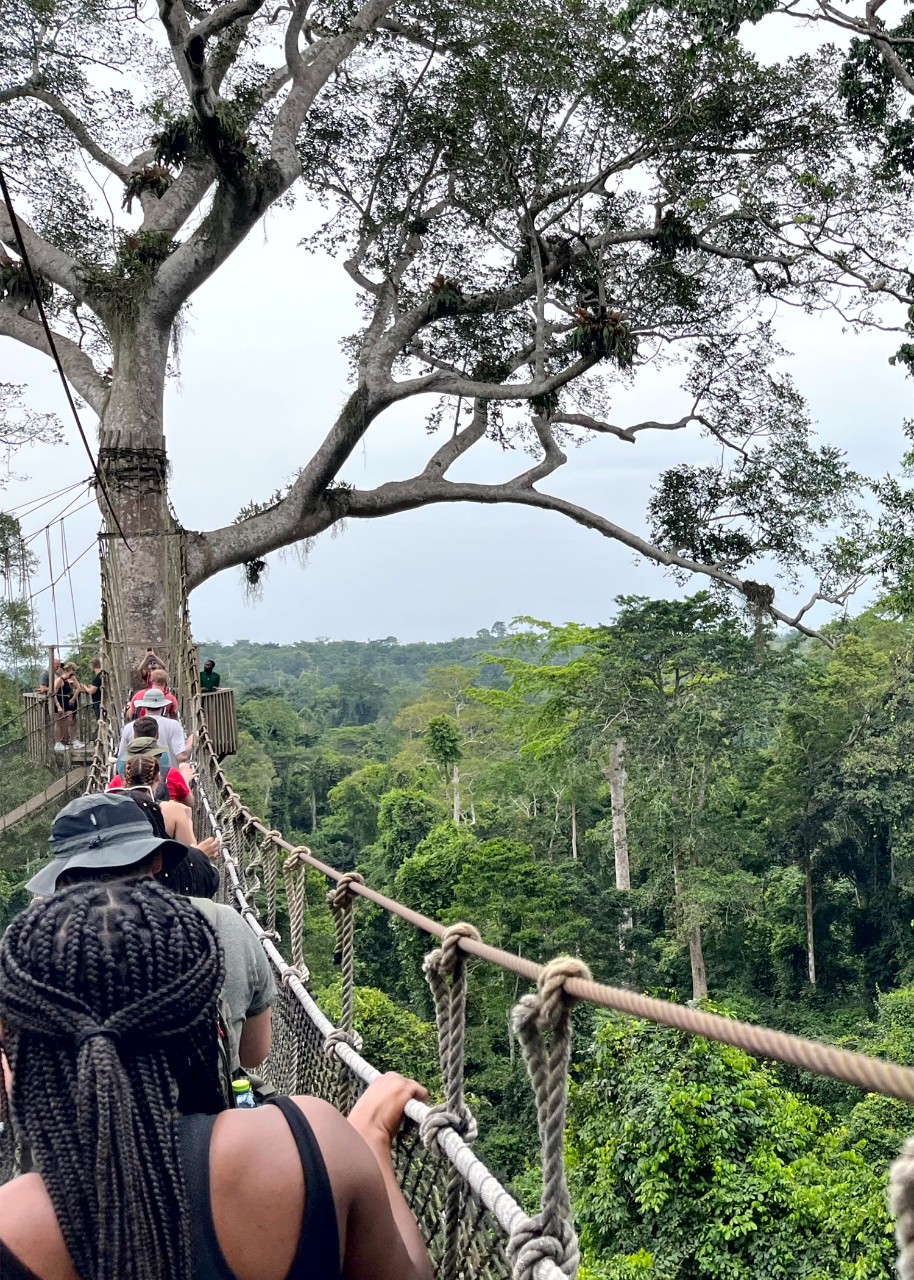
The UC Ghana group crosses a rope bridge in Kakum National Park | Photo provided
In Kumbasi, they were hosted by the Kwame Nkrumah University of Science and Technology (KNUST), which has one of Ghana’s leading engineering programs. They gave an impromptu presentation about UC and engineering studies to high school students at the nearby Prempeh College boarding school.
They toured historic and cultural sites, including a wetlands stilt village, a national park, traditional textile producers, and Elmina Castle, the infamous slave trade depot. They joined dance and drum classes at the universities. UCC’s Vice Chancellor hosted a dinner for them and a UC group from the Lindner College of Business.
They bonded over their experiences and over some universal truths of studying engineering.
“They went into some classrooms, and they came out saying, wow, engineering professors all over the world are the same — they’re in there harping on units!” co-lead Nora Honken laughed.

The Ghana group with faculty lead Cedrick Kwuimy. Beth Wilson is second from right | Photo provided
Kwuimy, a mentor to many of his group, encouraged those cross-cultural encounters because he knows how important it is to be at home outside your home culture. He immigrated to the US from Cameroon and South Africa 12 years ago.
“When I came here, I had culture shock. Even teaching was different, and I had to make sure I could communicate with my students. That was a long process for me, because I was not prepared.”
That preparation, he said, is important even if his students stay in Cincinnati, because so many multinational corporations and research institutions are headquartered here.
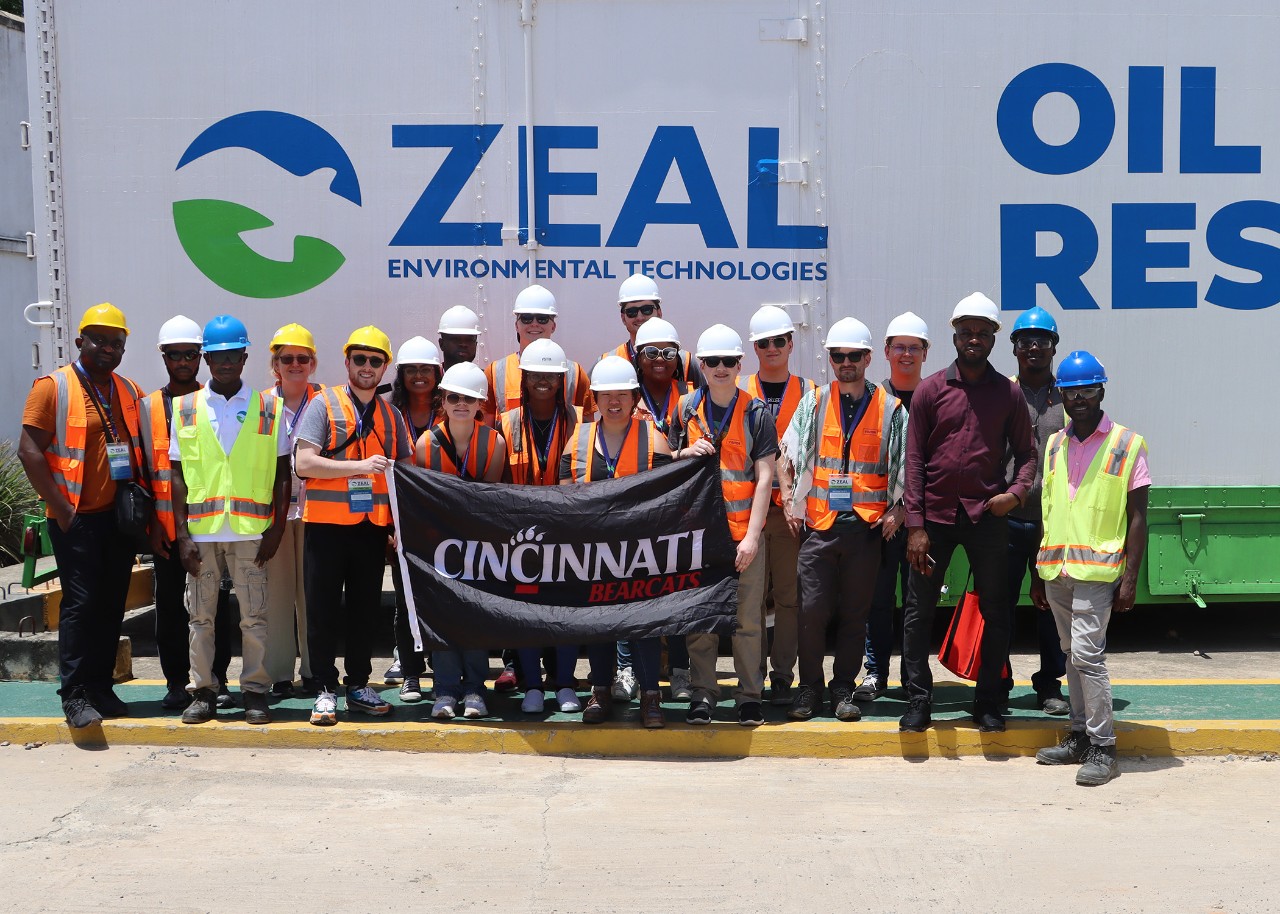
UC tour group with employees of Zeal Environmental | Photo Provided
The Ghana group’s industry visits ranged from a multinational corporation to a manufacturing startup. Each visit gave the students a different perspective on how context affects engineering. In Accra, they visited Air Liquide, which supplies industrial, medical and domestic gases. They visited Zeal Environmental in Takoradi to observe waste management operations.
Temple Corbett, a third-year chemical engineer minoring in biomedical electronics and computing, was struck by people’s conservation efforts and adaptive spirit.
“You hear about how America wastes resources — water, fossil fuels, gas or oil. Over there, it was interesting to see how much they value the preservation of resources.
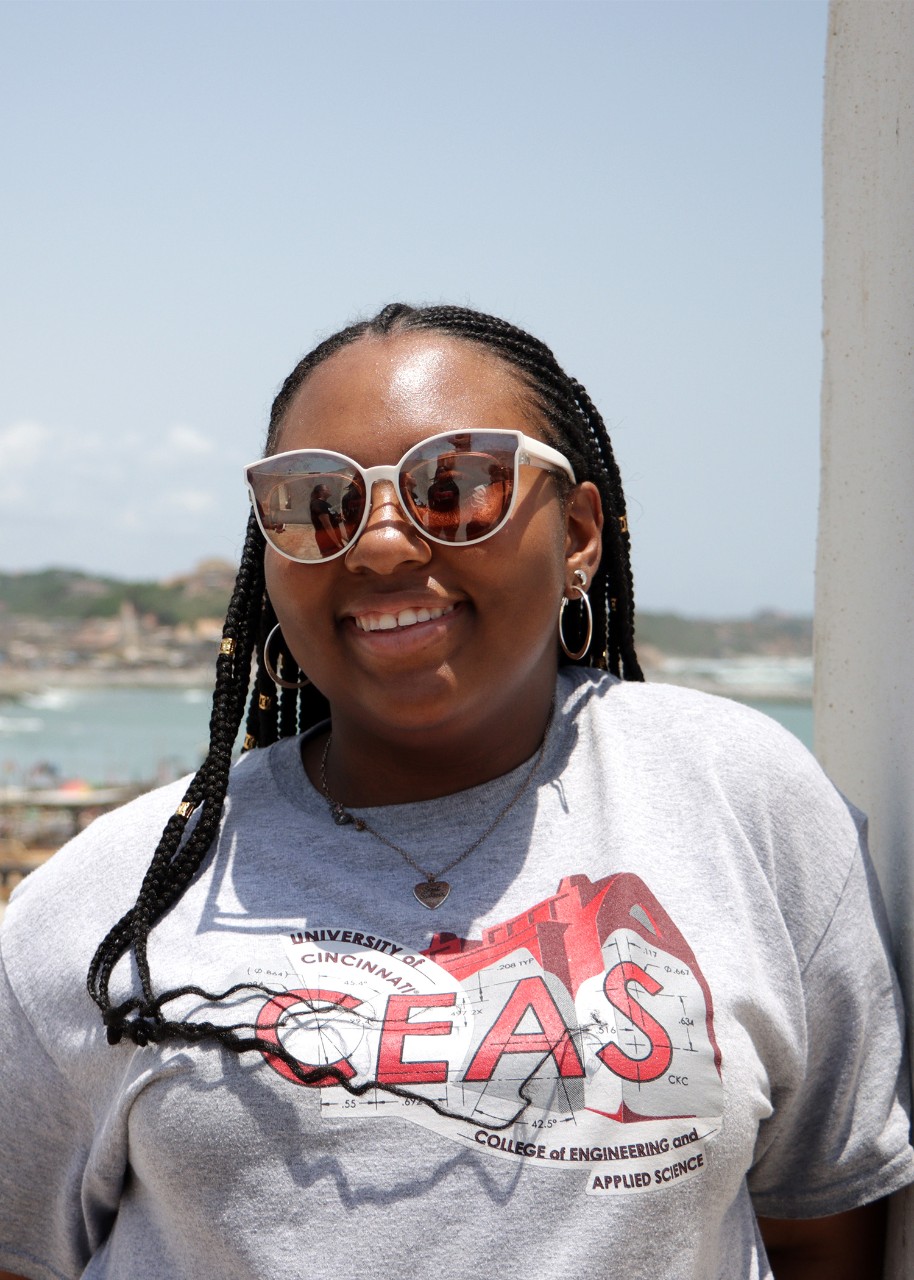
UC engineering student Temple Corbett at Elmina Castle | Photo provided
"I was surprised to see that they had a water heater and not just a ‘hot water’ setting. You had to turn it on and let it sit for a while before you could use the shower,” she said. “Seeing how engineers do work over there is an enlightening experience.”
The group visited Nature’s Treasure Foods, a new company that manufactures snacks. Managers did a special production run to demonstrate operations. The group’s one business student was especially engaged, asking questions about the company’s startup and business plan.\
Visiting SIKA International, which manufactures concrete products, two civil engineering students suggested the company use its academy (which trains industry customers about their products) for outreach to high school students as future engineers. The CEO later contacted the class at UC to help design the project.
Even the plane ride home offered one student a transformative experience. Biomedical engineer Wilson had picked her major to keep her options open, undecided whether to go to medical school.
“On my flight back, I sat next to an American surgeon. He and other surgeons from America go to Ghana and teach certain procedures, very advanced ones, for free. That is what I want to do with my life. … The trip definitely opened my eyes and mind to deciding this is what I want to do.”
What's Next
“Studying abroad teaches you things that you don't expect to learn,” said Miller (France). “You go there and you figure it out and you do it. And you have so much fun.”
The benefits of the study abroad experience were mutual. ENSEM professor Gallaire returned a thank-you for a thank-you, writing that seeing the students interact was a teacher’s best reward.
“Having you in Nancy was such an amazing experience for ENSEM students. You can't imagine how much they've learnt in two days. Some students who hardly spoke in class have been literally transformed. Meeting your group has been a catalyst. … They were all missing you after you left and came to see me to find a way to do internships in Cincinnati.”
Meeting your group has been a catalyst.
Stéphanie Gallaire International Relations U. of Lorraine ENSEM
CEAS Assistant Dean Mandy Albrecht, who accompanied the France tour, said,
“Watching the UC students interact with their French counterparts was an excellent example of applied learning. The students learned so much about navigating each other’s cultures and languages, which is an important skill for engineers in an ever-more globalized world.”
French Consulate officials visited CEAS in April and heard from some of the students; those who traveled to France had received a grant from the French Embassy Transatlantic Mobility Program, which promotes study abroad from both sides of the ocean.
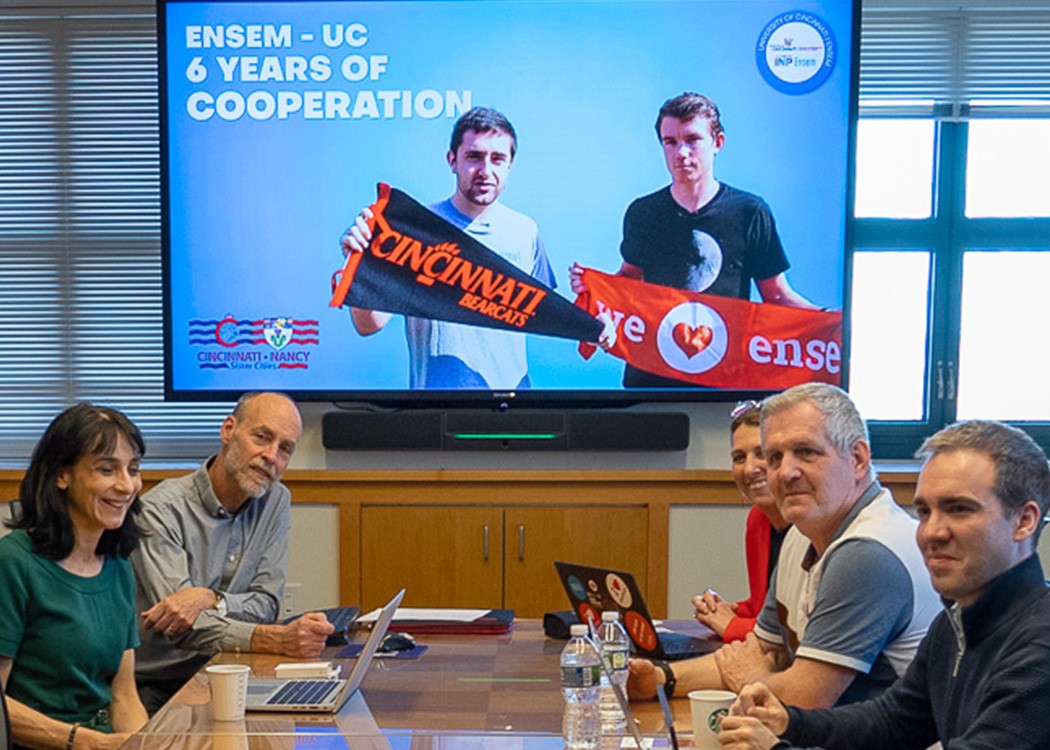
ENSEM delegation to UC, April 2023 (Gallaire and Rutz, left) | Photo provided
Rutz continues to recruit faculty and advisors to offer more tours and ensure that Global Technical Workforce continues beyond his involvement. Next spring’s tours are planned for Germany, Ghana and possibly France, where the college's expanding collaborations with the University of Lorraine and the University of Bordeaux offer scope for future study tours. He is also considering a potential virtual-only option for students who can’t travel.
Rutz also wants to build on the CEAS connection with University of the Basque Country for a program in Spain in 2025. Mexico, where UC is developing a strategic partnership with ITESM Querétaro, and Colombia, where Pontificia Universidad Javeriana is a strategic partner, are on his horizon.
Kwuimy hopes to develop a program in Botswana through UC’s developing partnership with the University of Botswana. He is connecting engineering student groups, and he and Dompreh plan to continue their collaboration and create student interaction before next spring’s Ghana tour.
Study abroad at UC is returning to pre-COVID levels, and opportunities are open to students in all programs.
Featured image at top: Students from the France group in the Place Stanislas, Nancy | Photo provided
Reporting includes student interviews by Natalie Ochmann and Kathleen Hornstra.
UC the World
Prepare yourself for a global future. Whatever your degree program, your plans or your passions, UC offers study abroad and international work experiences that will take you where you want to go. Explore the possibilities.
Related Stories
Global Technical Workforce course: Nine years, 11 study tours
May 11, 2023
This spring's Global Technical Workforce course in the University of Cincinnati's College of Engineering and Applied Science offered students in technical fields a chance to work virtually with a class of French students and travel to France or Ghana to build career "soft skills" that complement their technical skills.
With UC, you see the world
September 19, 2023
Study abroad is back to 75% of pre-COVID levels at the University of Cincinnati, and a wide variety of international study options is available to students in any program. Where do you see yourself in the world?
Chronicle of Higher Education: More international students finding success in U.S., Cincinnati
October 17, 2023
UC's Jon Weller speaks with the Chronicle of Higher Education for a story about growth in new student visas. India has overtaken China as the largest source of international students in the United States. At UC, India also continues the largest share of international students on campus.

